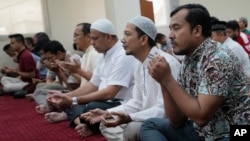Online hoaxes circulating widely in Indonesia since the start of the Israel-Hamas war are particularly dangerous because of sensitive underlying issues, experts say.
"In reality, fake news during wartime is not a new thing," said social media expert Firman Kurniawan, who teaches in the Department of Communication Sciences at the University of Indonesia in West Java. "It occurred in the Roman Empire, and that led to the saying, 'When war breaks out, truth is the first casualty.'"
In Indonesia, which has the world's largest Muslim population, millions of people watched a short video on platform X, formerly known as Twitter, titled "Armed Hamas men infiltrate an Israeli music festival using a paraglider and launch a massive attack resulting in numerous casualties." The video was later revealed to depict Egyptian paratroopers flying over the Egyptian Military Academy in Cairo.
Another widely circulated report claimed that U.S. President Joe Biden had provided $8 billion in military aid to Israel.
While Biden offered "any necessary support" to Israel, it was not of the magnitude suggested by the reports that came illustrated with what turned out to be altered screenshots of a White House release issued when Biden approved $400 million in aid to Ukraine last July.
The false post tapped into Indonesia's longtime support of Palestinian statehood based on a constitutional mandate to eradicate colonialism. President Joko Widodo reaffirmed his commitment to the Palestinian territories when Palestinian Prime Minister Mohammad Shtayyeh visited Jakarta in October 2022. Sovereignty over the land has been in dispute since biblical times.
A militant Muslim group, Hamas, carried out the Oct. 7 attack during a major Jewish holiday.
Hamas named the offensive the Al-Aqsa Storm, a reference to Muslim anger against the right-wing Israeli government's decision to allow Jewish fundamentalists to enter Islam's third-holiest site, according to a commentary by Mohammad Mazhari published by the Stimson Center, a think tank in Washington. Mazhari is a political scientist and served as the editor-in-chief of the Arabic MehrNews Agency.
The attack is the latest move in the long-running Israeli-Palestinian conflict that pits Hamas, whose adherents have a goal of destroying Israel, against the Israeli government and population.
Hamas perceives Israel as fundamentally racist against Muslims and anti-Palestinian, according to Mazhari, who added, the "narratives propagate hatred, providing a justification for the tragic events in the minds of both Muslims and Jews."
"This is different from the Ukraine-Russia conflict, which doesn't significantly affect Indonesian citizens. But when it comes to Palestine or Bosnia, it immediately stirs the emotions of our people."Satrio Arismunandar, media observer and former journalist at Kompas
Firman believes three factors contribute to the extensive production of fake news during the Hamas-Israel conflict.
"First, the public finds itself in an information imbalance, where a significant event occurs, and people are eager to know what really happened," he told VOA Indonesian earlier this week.
"Second, those involved in the conflict – in this case, Hamas and Israel – both seek public support."
"Third … everyone can produce and distribute information."
Firman continued, "Today, these three points converge, so when one party seeks support, emotionally charged information is produced to garner that support."
Media observer and former journalist at Kompas, Satrio Arismunandar, shares a similar view, saying the rapid spread of fake news is nothing new.
"However, the difference today is the presence of various sophisticated media devices and information technologies, making it even easier," Satrio told VOA Indonesian earlier this week.
"Israel and Hamas undoubtedly have their own public relations or propaganda machinery, but what is currently buzzing is the initiatives of individuals in Indonesia who cannot be controlled because [the war] touches their emotions.
"This is different from the Ukraine-Russia conflict, which doesn't significantly affect Indonesian citizens. But when it comes to Palestine or Bosnia, it immediately stirs the emotions of our people," he said.
But when fake news is taken at face value, the consequences include the risk of making ill-advised decisions, particularly in the context of a conflict.
Thadeo Arlo, an Indonesian student In Tel Aviv who decided to stay in the city despite the conflict, experienced this firsthand. He's making critical safety decisions based on the information he receives online.
"One thing is for sure, I will never go to TikTok," he told VOA Indonesia. "I only want to receive information from reliable sources, such as the university or government. I also don't rely on Instagram or Telegram because they often contain inaccurate information."
Many of the misleading claims are circulating in Indonesia via X, the platform formerly known as Twitter.
In a statement on X, which has more than 528 million users, the platform's management said it had removed newly created accounts affiliated with Hamas and had "taken action against tens of thousands of graphic posts, violent rhetoric, and hate speech."
However, X did not specify whether these posts were removed or dissemination curtailed.
Firman advises social media users to "realize that during a conflict, all parties seek support for themselves, which is achieved by producing information to discredit the other side. In pursuing this goal, they do not prioritize the accuracy of the information."
He urged news consumers to "diversify our sources of information," look for fact-checked reports and "become accustomed to not immediately trusting information."





